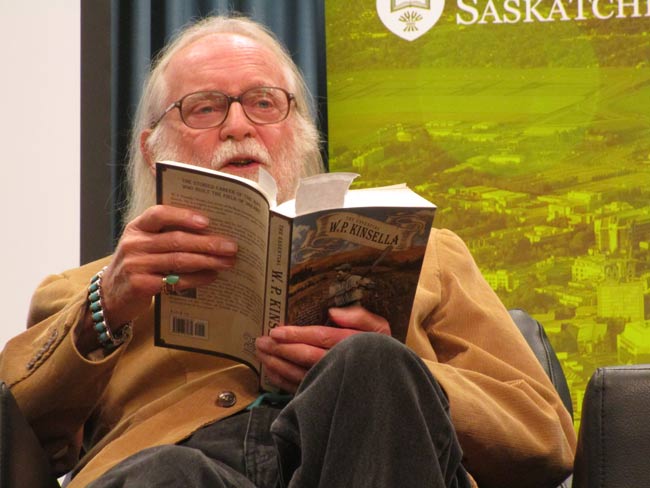Bill, I see on your website, that you have written quite a
number of books, either novels or short stories where Baseball
plays a key role to tell your stories. Is there a specific
reason that you choose Baseball as the subject for these novels?
W.P. Kinsella:
I wrote S. J. ("Shoeless Joe") and then discovered that there
was an untapped market for baseball fiction. That is akin to a
prospector finding a luscious vein of gold. Work the vein until
it is all gone. I wrote about a dozen more books about baseball
and magic.
Wolfman
Shapiro:
Bill, so I read that the movie "Field of Dreams" was basically filmed
in 1988 and a part of it was done in early 1989, with the film
itself coming out in April. When were you first approached by
someone in Hollywood to discuss making "Shoeless Joe" into a
movie?
W.P. Kinsella:
A small company optioned it right after it was published (1982), but
did nothing (with it) and (then) the option expired. One of the
big studios optioned it and hired Phil Alden Robinson to do the
screenplay. When it was finished they said, this is good, but it
is a SMALL movie, and we are not making small movies this year.
So, (it was a) no go. Phil then asked if he could shop the
script around and Universal eventually put up the money (for
it), they took a smaller budget so Phil could direct it, because
he didn't trust the Hollywood morons. A great move because they
tried everything to change the script, but Phil stuck to his
vision. The success of Field of Dreams is due to savvy and
courage of Phil Alden Robinson.
Wolfman
Shapiro:
Bill, I have heard from my brother, who is a script writer for
films for Hollywood, that once an agreement is reached, the
production company and the director have total control of the
film and then, in your case as an author, they can decide in
whatever way they wish how they want to
present the story in the book even if they must change the story. Was there any special requirements you
made before you agreed to let the movie version come out? Did
it take a long team to come to an agreement with the final
production company?
W.P. Kinsella:
I had no say in the process. (I) wouldn't want to. I know
nothing about film making.
Wolfman
Shapiro:
Bill, now I haven't read your novel yet (note: I
did this interview in July) but according to Wikipedia, some
of the characters we met in the movie were not in the original version of the novel, in particular J. D. Salinger who I am
guessing became the character we saw named Terence Mann? How
did you feel about the changes to your story that we saw in the
film?
W.P. Kinsella:
They were good. More people would see the movie opening day than
that had ever heard of the book. Getting James Earl Jones (to
play him) was a wonderful choice.
Wolfman
Shapiro:
Bill, can you share with us other changes that were made in the
film which didn't follow your novel?
W.P. Kinsella:
The PTA scene (note: a local meeting that was held at
the nearby school by their farm talking about banning certain
books like one written by Terence Mann) was created to give
(the character of Annie played by) Amy (Madigan) more
screen time and set up the James Earl Jones character. Time had
to be telescoped and extra characters cut to streamline the
story. All good choices (in my opinion). I am one of the only
writers who was happy with what Hollywood did with his novel.
Usually they destroy it. All credit to the tenacity of Phil
Robinson.
Wolfman
Shapiro:
As a result of the success of the film, did this help you with
your career as a writer? Were more of your books sought after
to be published due to the film?
W.P. Kinsella:
My books became more popular. My backlist sold wonderfully well.
I earned a lot of money.
Wolfman
Shapiro:
Did the noteriarity that came from the success you had with the
film and then later through your novel, change your life at all?
W.P. Kinsella:
Only, that I no longer had to worry about money.
Wolfman
Shapiro:
Now while the movie was actually being filmed especially the
scenes linked with the Lansing's Farm, were you allow to be on
the set during the filming? Betty (Lansing) told me in her
interview that she and her family members were allowed on the
set and were actually included in some scenes of the movie
playing in backup roles.
W.P. Kinsella:
We were allowed on the set. I met Don Lansing, and in later
visits his wife Becky. I believe I also met Don's mother.
Wolfman
Shapiro:
During the filming of the movie were you being consulted in any
capacity, acting like an advisor either for the actors/actresses
or for the story development?
W.P. Kinsella:
No.
Wolfman
Shapiro:
Ok, then did you have a chance to meet the star actors/actresses
from the movie or the director?
W.P. Kinsella:
I met Kevin (Kostner) and Amy (Madigan), and Gaby Hoffmann (note:
who played their daughter Karin), and of course Phil
Robinson. I found the whole process a terrible bore. It is all
(about) waiting. If I directed actors (it) would (go for) two
takes only. The most interesting person I met on the set was
Gaby Hoffman's mother, Viva, the former Andy Warhol movie star.
She was delightful and a very talented artist.
Wolfman
Shapiro:
Were you happy with the performance of the actor/actress
portraying your characters in the story? Who did the best job
of acting coming closest to how you show their character in your
novel, in your opinion?
W.P. Kinsella:
I loved the performances, particularly by James Earl Jones and
Burt Lancaster. My only criticism was that they might have found
a child actor who looked like she could have been Kevin and
Amy's child.
Wolfman
Shapiro:
What advice would you give to anyone reading this interview who
might be an aspiring writer - based on your own experiences you
have had during your life?
W.P. Kinsella:
Read, read, read, read, and then read some more. When you find
something that thrills you, take it apart sentence by sentence,
line by line, word by word to see how the author thrilled you.
Then use those tricks the next time you write. Pay no attention
to reviews. My motto has always been. Dogs bark but the caravan
rumbles on.
Wolfman
Shapiro:
It seems you have lived in Canada all your life as you told me
before but now you are in the province of British Columbia -- did you ever
have an interest to live outside of Canada?
W.P. Kinsella:
In a Perfect world I'd be living in Palm Springs, CA. I love the
heat and the Coachella Valley. But in Canada medical emergencies
do not bankrupt you. Therefore I kept my Canadian residency. Had
I been in the US my late wife's illness would have bankrupted
me.
Wolfman
Shapiro:
What do you feel in your more than 80 years of life, is the most
important contribution you have made to either help or inspire
others or to create a better world?
W.P. Kinsella:
I really don't think in those terms. I hope my stories have made
a few people laugh and left a few others with a tear in their
eye. For my epitaph I would choose an epigram by British writers
Hilaire Belloc: When I am dead, I hope it May be said, His sins
were scarlet, but his books were read.
Wolfman
Shapiro:
If you had the chance to re-do all you did with the novel, the
writing and what came afterwards with "Shoeless Joe", would you
do it again?
W.P. Kinsella:
Yes.
Wolfman
Shapiro:
What was your opinion of the Lansing Family keeping the Baseball
Field as is after the filming was completed, and allowing people
to visit this Baseball Field?
W.P. Kinsella:
I certainly would have charged admission, as Ray does in the
novel and movie.
Wolfman
Shapiro:
Have you personally spoken to the new owner Denise Stillman?
Has she invited you to come back to the "Field of Dreams Movie
Site" to perhaps participate in any of the special new events
her and her team are creating and offering.
W.P. Kinsella:
No to all. Over the years I should have been invited to major
events at the field, but never was. I am now too old to travel
any more.
Wolfman
Shapiro:
Bill, thank you so much for giving to me some of your time. All
the best with what is coming up for you. You have many fans
amongst our members.
-------------
Wolfman: Well, if you haven't read any of Mr. Kinsella's book, you can
find them all at the library. As of the time I am putting
together this interview for the newsletter, I still have three more books
to
read by Mr. Kinsella. Anyway, being a fellow
author/writer, the greatest gift we can receive is to watch how
our work, our information or story, is able to effect other
people and help them to live
a happier more productive life or give some type of inspiration
where a person finds a special gift inside of them to share with
the world.





